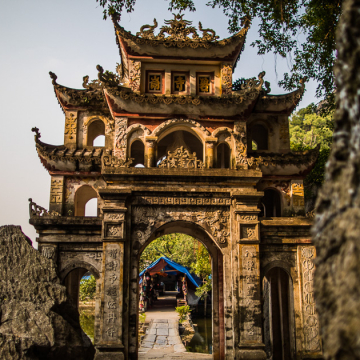
Upon exiting the Temple of Literature, located in the heart of Vietnam’s capital city, Hanoi, my senses became conscious of the unabating sounds of the encircling traffic. The sound of horns and the motorcycle engines is intrusive and encompassing.
Having spent almost two weeks travelling throughout Vietnam by this stage, I felt I had become familiar to the movement and apparent chaos of the country. Why was the traffic noise so apparent now? It was in retrospect then that I realised the peace and serenity experienced was only apparent while inside the Temple. There was a complete absence of sound inside versus the all-surrounding and continuous noise out in the streets. I was feeling and experiencing a moment of Yin Yang.

Originating from Tao philosophy, Yin Yang is the necessity of balance of all things in life. Opposing forces which actually interact and complement each other. Vietnam is a cacophony of opposing forces, yet fluidity and balance is obtained in all facets of life. Yin Yang forms the essence of Vietnamese culture.
This concept is most evident when attempting to cross a busy Vietnamese street (is there a street in Vietnam that isn’t busy?). Our advice on arriving: Keep together; move slowly; move with purpose. The motorcyclist will anticipate your course and navigate accordingly. Any sudden movements and the balance is broken. We soon learnt to maintain the equilibrium.

This is a country that has endured a long and tormented history of occupation, war and oppression. The contrast of lifestyle the north leads compared to the south is evident. While maintaining a harmonious and happy co-existence as one united country, there are still remnants of begrudging memories – if you look hard enough.
The architectural influence of the French colonisation can be experienced in a visit to Hô Chí Minh’s Central Post Office. Constructed in the early 20th Century by famous architect, Gustave Eiffel, its grand and ornate interior is matched by its traditional bright yellow exterior. Add it to your itinerary.

Equally remarkable is Hô Chí Minh’s Mausoleum, located in Ba Dình Square, Hanoi. Far from ornate and colourful, this grey marble and granite structure houses Vietnam’s first president, affectionately known as ‘Uncle Hô’.
It’s arguable that Yin Yang’s influence is most evident in Vietnamese cuisine. The balance of flavours, textures, aroma and presentation unifies this country above all else.
A must try is the delicacy, Bánh Xèo with its pungent mix of fried pork and shrimp tangling with the sweet aroma of the rice batter pancakes. Combine this with herbs, sprouts and a tangy dipping sauce, and your worlds will collide.

similar ‘collision’ can be achieved when a hot, humid and sultry day can be tempered down with a refreshing chilled bottle of Bia Saigon or a more traditional and highly popular, Cafe Sua Da (Vietnamese iced coffee).
Vietnam is perpetually on the move. For some it can be overwhelming. The trick when visiting this beautiful country is to locate it’s Yin Yang. Whether it be a moment of silence, a recognition of your surroundings or a combination of flavours, once you locate its essence, if only for a second, Vietnam stands still.







Vacations & Travel Magazine



